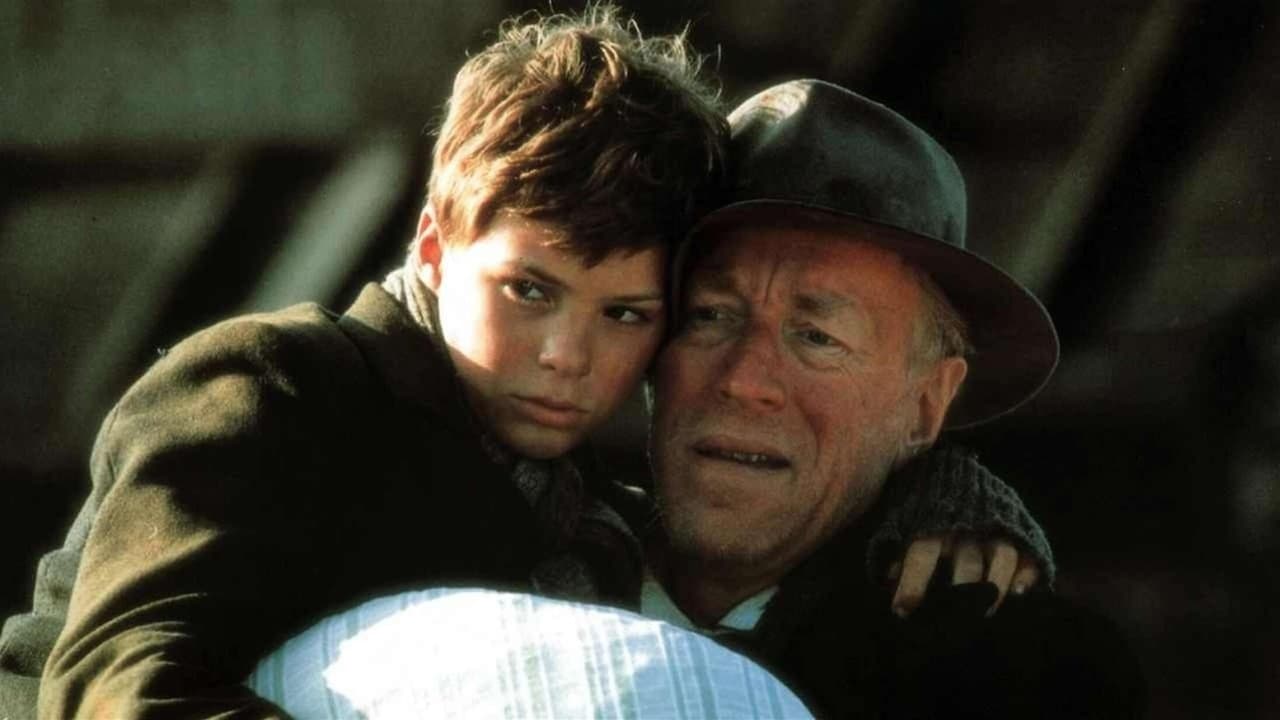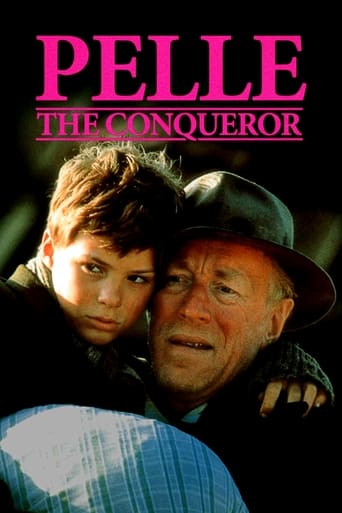

The opening scene in Bille August's "Pelle erobreren" ("Pelle the Conqueror" in English) shows a father and his son moving from their native country to a new one in search of a better life. The father finds work on a farm, but gets subjected to abuse every step of the way while his son gets bullied. The movie takes place in Denmark in the 1800s but could just as easily apply to a modern setting, as people continue to leave their native countries in search of a better life elsewhere, accepting the inevitable abuse. As for what we find out about the employer, that's probably a common occurrence also.Max von Sydow puts in an outstanding performance as the desperate father, always thinking of his son. The movie won a well deserved Oscar for Best Foreign Language Film, only the second Danish film to do so.All in all, the Scandinavian countries have turned out some masterful cinema. I highly recommend this one. Bille August later directed the 1998 adaptation of "Les miserables".
... View MoreThe end of the 19th century. A boat filled with Swedish emigrants comes to the Danish island of Bornholm. Among them are Lasse and his son Pelle who move to Denmark to find work. They find employment at a large farm, but are treated as the lowest form of life."Pelle the Conqueror" won the Academy Award for Best Foreign Language Film, 1988; it was submitted to the Academy by the Danish government, giving Denmark its second consecutive win after "Babette's Feast". Max von Sydow was nominated for the Academy Award for Best Actor, but lost to Dustin Hoffman for "Rain Man".First of all, well done Denmark on the back-to-back wins. Few people discuss the "Danish film industry", but it appears that at least for a few years it was going strong. (I suppose people tend to include it as a broader category, the Scandinavian film industry.) Max von Sydow is one of my favorite actors and he deserves all the nominations and awards he can get. I can accept him losing to Dustin Hoffman, though. "Rain Man" is not just a great film with a great role, but unlike most Oscar movies has become part of our popular culture.
... View MoreI can see why "Pelle the Conqueror" won the Oscar for Best Foreign Language Film. It's exceptionally well made. However, I am warning you that although it's worth seeing, it's not a particularly pleasant film--as it's grim from start to finish...VERY, VERY grim.The film is set in late 19th century Denmark. It begins with an older man (Max Von Sydow) and his young son, Pelle, arriving there from Sweden. According to the dad, Denmark is a land of many opportunities and there life will be so much better than it had been back home. However, soon they learn that life is dreadfully oppressive here in their new home. They are hired on as indentured servants of sorts--and even the young boy must toil very hard on this farm. In some ways, they are like slaves as the food is terrible, the hours long and there is almost no let up to the bleakness of their lives. Many awful things happen through the course of the film--murdered babies, people getting pounded in the head by a large stone, rapes, and Pelle ultimately learns that through all this, his father is a spineless wimp.This movie does seem to illustrate just how tough life was and does a great job of showing the lives of illiterate workers, but it's also a real chore to stick with it. Lovers of art films will probably be able to stick around for the almost three hour running time--most of the rest will not. In many ways it reminds me of other Oscar-winners like "The Last Emperor" and "The English Patient"--very grim and miserable films. However, at least with "Pelle" you actually care about the characters--which makes it worth seeing IF you are very, very patient. However, if you are depressed at all, do NOT watch the film--it might just push you over the edge.
... View MorePELLE THE CONQUEROR may now be twenty-three years old as a film but the power and beauty of this epic masterpiece from Denmark still retain the brilliance of its original 1987 theatrical release. Based on a four volume novel by Martin Andersen Nexø the screenplay by writer/director Bille August, Per Olov Enquist, and Bjarne Reuter granted takes only a small portion of the original story and that explains why so much of what happens in this 2 1/2 hour film is only vaguely explained, but the end result is a marvelous drama of the relationship of a father (Lassefar, brilliantly realized by the venerable Max von Sydow), who has pride but has not the courage of his convictions, and a son (Pelle, a masterpiece of young acting by Pelle Hvenegaard) who dreams of finding a life better than the bitterly poor existence he shares with the father he loves. The film takes place in Denmark near the turn of the 19th century over the course of a year and during that time the Pelle encounters peer prejudice from being a Swedish immigrant who has traveled to Denmark for the good life, class distinction between the wealthy landowners and the poverty stricken workers, the double standard of morals of the learned 'role models', death, physical abuse, young love between two lovely people who out of fear drown their infant at birth, the harsh realities of gathering sustenance from laboring the land and the sea, the bonds of true friendship with a bastard child of the land owner, and the disappointment of losing hope of conquering the world by means of accompanying a friend who must remain a vassal for two years who becomes brain damaged in an alteration with the foreman. Yet through all of these lessons Pelle learns about the survival of the fittest and despite all odds being against him, strikes out toward the frozen sea to await his ship of fortune. This is a film about dreams and realities, about surviving physical and mental stresses, about adapting to the seasons and the struggles of indentured life. The stench of the farm and the grace of the snowfields are captured with amazing perfection by cinematographer Jörgen Persson and the mood of this film's story is accompanied by the music of Stefan Nilsson. The cast is huge and uniformly excellent, much due to the sensitive direction by Bille August. This is a classic film, one that is enjoyed more with repeated viewings. This is definitely one for the home library. Breathtaking. Grady Harp
... View More